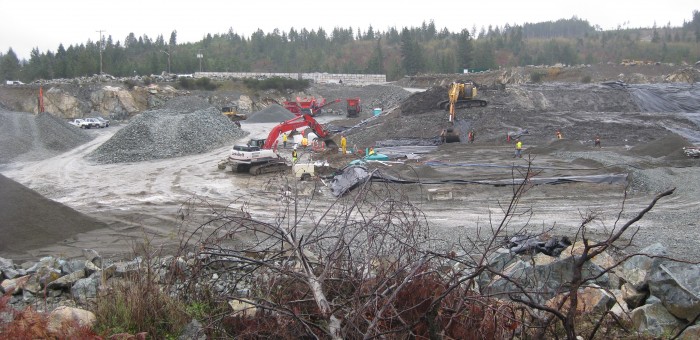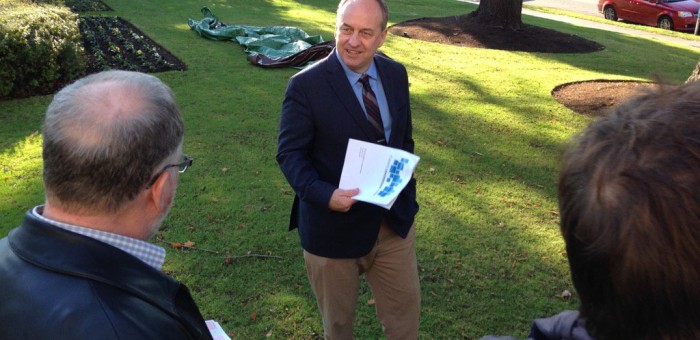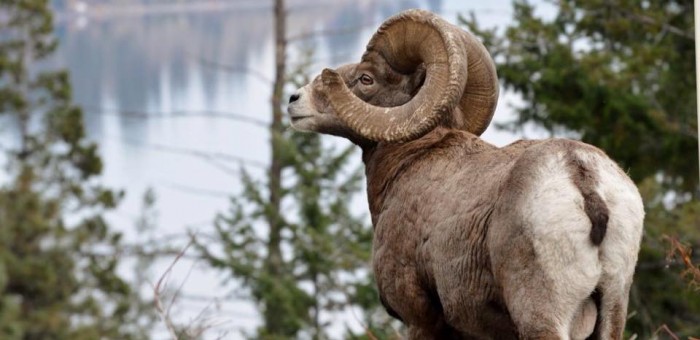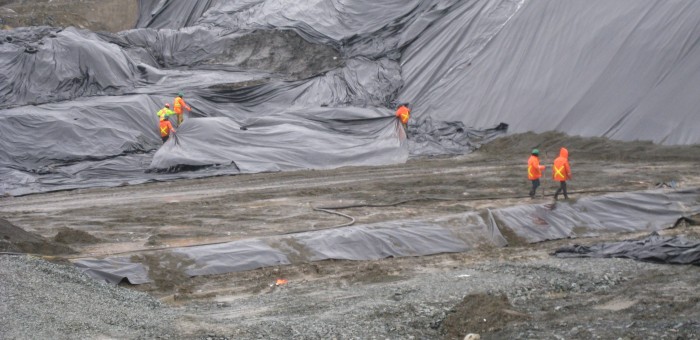Environment
Operations should immediately cease at Shawnigan soil treatment site
Media Statement December 1, 2015
Operations should immediately cease at Shawnigan soil treatment site – Andrew Weaver MLA
For Immediate Release
Andrew Weaver, MLA for Oak Bay Gordon Head and Deputy Leader of the BC Green Party is calling on Island Health and the Ministry of Environment to immediately shut down operations at the contaminated soil processing facility near Shawnigan Lake, in response to a CVRD report released today.
“The release of the engineering report raises very serious concerns regarding the safety of the ongoing operations.” said Andrew Weaver. “There has been a profound and pervasive dereliction of duty within the Ministries of Environment and Energy and Mines. The citizens of the region have collectively lost confidence in the ability of the BC Liberals to look out for their safety.”
The report, commissioned by the Cowichan Valley Regional District, identifies serious concerns about surface runoff and throughflow potentially becoming contaminated but not adequately being contained or treated. In particular, it concluded that “runoff storm water sourced from the SIA site is bypassing the sediment pond (i.e. by flowing under it) and is being discharged directly onto the land owned by the CVRD.” This occurred despite the fact the BC Government mandates that all surface water is required to be “contained on the property and treated in accordance with the permit”.
The report cites a lack of clarity regarding provisions related to the infiltration of surface water and suggests that “stormwater from a facility that handles contaminated soil should be managed in a way that allows for contaminant sampling and controlled discharge.”
“How the BC Liberals issued an operating permit in light of the very serious findings of the CVRD report is beyond me.” said Andrew Weaver. “The permit should be immediately rescinded, operations ceased, and a full independent investigation initiated.”
-30-
Engineering report commissioned by CVRD (Linked here)
Media Contact
Mat Wright
Press Secretary – Andrew Weaver MLA
Cell: 250 216 3382
Mat.wright@leg.bc.ca
Twitter: @MatVic
Parliament Buildings
Room 027C
Victoria BC V8V 1X4
Climate Action Recommendations Highlight Inaction of Current Government
Media Release – November 27th 2015
Climate Action Recommendations Highlight Inaction of Current Government
For Immediate Release
Victoria B.C. – Andrew Weaver, MLA for Oak Bay Gordon Head and Deputy Leader of the BC Green Party called today’s release of the Climate Leadership Team’s recommendations the clearest sign yet that Christy Clark’s B.C. Liberal government is failing to demonstrate any leadership in addressing climate change.
The recommendations show that due to the choices this government has made since 2012, there is no longer a pathway to meet our 2020 GHG reduction targets. The government’s response has been to highlight the need for a new 2030 target, with little offered about how we can get there.
“Setting targets is meaningless if the policy isn’t there to go along with it,” said Andrew Weaver. “I am deeply concerned that the government will use these recommendations to advance the political goals of the government, allowing them to talk about leadership now, without having to implement a single policy until after the next election.”
The report was submitted to government on October 31st but not made public until today, preventing any public debate while the legislature was sitting for the fall session. Furthermore this report comes on the last Friday before the Paris COP conference, giving the Premier an opportunity to talk about leadership, without having to commit to a single policy after the fact.
“The release of this document today is in keeping with this government’s approach of saying one thing and doing another,” said Andrew Weaver. “Premier Clark is now able to feign leadership in Paris this Fall, and then announce their true intentions next year when they bring their actual plan forward.”
Andrew Weaver served on the first Climate Action Team, set up by Gordon Campbell in 2007. At the time, the team was told that they had a responsibility to engage with British Columbians about the climate action plan they were developing. This contrasts sharply with the 2015 Climate Action Team set up by Christy Clark, where they were required to sign confidentiality agreements and were prohibited from talking about their work.
“Christy Clark’s government has steadily dismantled the innovative climate policy initiated under Gordon Campbell,” said Andrew Weaver. “The recommendations released today offer one pathway to reclaiming the leadership we have lost. If the government is serious about being a leader, they need to start implementing policy not making promises and setting new targets.”
-30-
Media Contact
Mat Wright
Press Secretary – Andrew Weaver MLA
Cell: 250 216 3382
Mat.wright@leg.bc.ca
Twitter: @MatVic
Parliament Buildings
Room 027C
Victoria BC V8V 1X4
A Bill to Reduce Preferential Treatment of Non-Resident Hunters
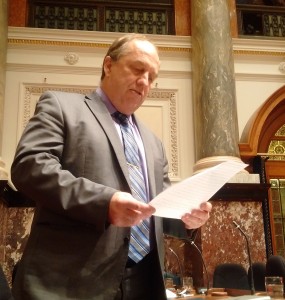 Today in the legislature I tabled a private members bill entitled: Wildlife Amendment Act (No. 2), 2015. The purpose of this Bill was to reduce the preferential treatment of non-resident hunters.
Today in the legislature I tabled a private members bill entitled: Wildlife Amendment Act (No. 2), 2015. The purpose of this Bill was to reduce the preferential treatment of non-resident hunters.
Limited entry hunting (LEH) is a lottery based management system used to organize the harvest of species in situations where there are too few animals and too many hunters. Currently the Wildlife Branch has different rules for resident and foreign hunters when it comes to obtaining LEH permits: Residents must enter a lottery draw, but foreigners (who are required to hire guide) can simply buy their way in. By eliminating the minister’s discretion to make separate rules for each group, this bill requires ALL hunters to enter a lottery for their LEH tags, as is done in other jurisdictions.
As it currently stands, residents may enter a lottery year after year and still not get drawn, while a non-resident can buy his or her way in every year if they want. This bill seeks to ensure certain groups do not have unfair access to LEH permits.
While people may wonder why we need a lottery system for non-residents when they are already restricted by the allocation split, it is worth noting that the split between permits allocated for resident and non-resident hunters is as high as 60% – 40% for some species. By comparison, Alberta sets non-resident allocations between 2-7 percent with a maximum of 10 percent and Washington State has limited non-resident wildlife allocations to approximately 5 percent. Non-resident hunters in B.C. are already getting a bigger share here than anywhere else in North America – and they are pay significantly less too. A non-resident hunter coming to B.C., for example, can buy a moose tag directly for $250.00 Canadian. In Washington State they would have to enter a draw and if their application got randomly selected they would have to pay $1,652.00 USD.
The price and availability of hunting permits is, of course, influenced by animal abundance and hunter demand. In B.C. compared to other jurisdictions in North America, however, they also seem to favour guide outfitters and their non-resident clientele over resident hunters. I tabled this bill today to reduce some of that unfair legislation.
Below I provide a video of my introduction along with its transcript. At the end i also include a copy of the proposed bill
Video of Bill Introduction
Text of Bill Introduction
A. Weaver: It’s my pleasure to introduce this bill — which, if enacted, would remove the minister’s ability to designate and exempt classes of applicants from having to enter lotteries or other methods of random selection when seeking limited-entry hunt permits. If enacted, these amendments would require all hunters to enter draws for their limited-entry hunt permits, regardless of resident, non-resident or non-resident alien designation, as is done in other jurisdictions.
As it currently stands, local hunters have to enter a lottery if they want to harvest an animal managed under the limited-entry hunt system, but out-of-province hunters can simply buy a permit for the same species and management unit area. Foreign hunters coming to B.C. already enjoy cheaper permits and greater allocation percentages than nearly every other jurisdiction in North America. It’s clearly unfair that they can buy their way into limited-entry hunts year after year, when British Columbians are left entering lotteries in the hopes of being granted the opportunity to harvest a public good in their home province.
The limited-entry hunt system is an important management and conservation tool. Its designation through the lottery system should be implemented across the board, mirroring other jurisdictions that require non-resident hunters to enter limited-entry hunt lotteries. Like every state in America, this legislation envisions a separate draw for local and out-of-province allocations.
I look forward to second reading of this bill. I move that this bill be placed on the orders of the day for second reading at the next sitting of the House.
Text of Bill M230
Wildlife Amendment Act (No. 2), 2015,
THE WILDLIFE ACT [RSBC 1996] Chapter 488. The Act is amended by:
Section 16 of the Act is amended by striking out sections 16 (1) (b.1) and 16 (3)
Limited entry hunting authorization
16 (1) The minister, by regulation, may
(a) limit hunting for a species of wildlife in an area of British Columbia,
(b) provide for limited entry hunting authorizations to be issued by means of a lottery or other method of random selection among applicants,
(b.1) provide for exceptions that the minister considers appropriate to the random selection among applicants in conducting a lottery or other method of random selection among applicants under paragraph (b), and
(c) do other things necessary for the purposes of this section.
(2) An application fee collected under a lottery or other method referred to in subsection (1) must be paid into the general fund of the consolidated revenue fund.
(3) In making regulations under subsection (1), the minister may define classes of applicants and make different regulations for different classes of applicants.
Appealing for Emergency Debate on Contaminated Soils in Shawnigan Watershed
Today in the Legislature I rose, pursuant to Standing Order 35, to call for an emergency debate on the recent failure of the contaminated soil site storm water containment and clarification system at the South Island Aggregates/Cobble Hill Holding/South Island Resource Management operations.
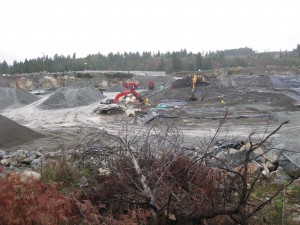 There are two active cases before the BC Supreme Court concerning the process that led to the granting of the permits by the Ministry of Environment. The CVRD is seeking to have its land-use bylaws upheld, as this is not a permitted land use for this location. The Shawnigan Residents Association has filed a Judicial Review of the decision by the Environmental Appeal Board to uphold the permit, and they have brought forward new and very important information that was not considered by the Environmental Appeal Board. Local residents are desperate to protect their water supply, and last week two people were arrested outside of the site.
There are two active cases before the BC Supreme Court concerning the process that led to the granting of the permits by the Ministry of Environment. The CVRD is seeking to have its land-use bylaws upheld, as this is not a permitted land use for this location. The Shawnigan Residents Association has filed a Judicial Review of the decision by the Environmental Appeal Board to uphold the permit, and they have brought forward new and very important information that was not considered by the Environmental Appeal Board. Local residents are desperate to protect their water supply, and last week two people were arrested outside of the site.
Below I offer an extract from Hansard where I provide rationale for why I believed that holding such a debate was of urgent public importance. Please note that in a postscript below I reproduce the Speaker’s ruling.
Text of my Rationale
A. Weaver: I rise pursuant to Standing Order 35. As advised in Standing Order 35, I gave the Chair notice, and I have provided a written statement of the matter proposed to the Clerk.
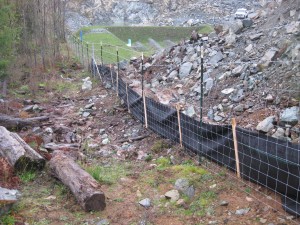 By leave, I move that this House do now adjourn to discuss a matter of urgent public importance — namely, an emergency debate concerning the recent failure of the contaminated soil site stormwater containment and clarification system at the South Island Aggregates — Cobble Hill Holdings — South Island Resource Management operations.
By leave, I move that this House do now adjourn to discuss a matter of urgent public importance — namely, an emergency debate concerning the recent failure of the contaminated soil site stormwater containment and clarification system at the South Island Aggregates — Cobble Hill Holdings — South Island Resource Management operations.
There were, in the past few days, at least two documented breaches of water bypassing the system into the Shawnigan potable water stream network. On November 13, Island Health issued a no-water use advisory “advising residents not to use water taken out of the lake from the south end of Lake Shawnigan, south of Butler Avenue and Verlon Road, due to suspected overflow of water from South Island Aggregates’ site.” This means that residents were being advised “not to use or draw water from the area of the lake for residential or commercial use, including bathing, personal hygiene, drinking and food preparation.”
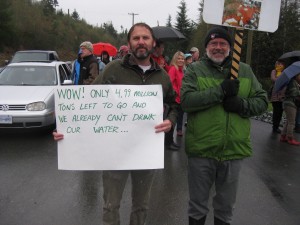 This morning I visited the area today to witness many scores of residents of Shawnigan Lake standing along the roadside desperately seeking government action. Despite the fact that members opposite think this is a joke, I walked around the facility this morning, and there is water running off that facility today in violation of the permits that they have been granted. Yet we have the side opposite thinking this is somehow a big joke.
This morning I visited the area today to witness many scores of residents of Shawnigan Lake standing along the roadside desperately seeking government action. Despite the fact that members opposite think this is a joke, I walked around the facility this morning, and there is water running off that facility today in violation of the permits that they have been granted. Yet we have the side opposite thinking this is somehow a big joke.
Last week a steady stream of trucks brought in high-sulfur soils, further contaminated with hydrocarbons from the metallurgical coal activities that occurred at Pacific Coast Terminals in Port Moody. Five thousand people draw their drinking water from this lake, and 12,000 people live within the region.
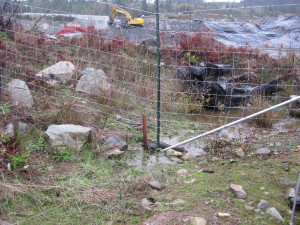 There are several court cases before that we will obviously not have time but could explore in debate, and local residents have documented many cases of non-compliance. And as of this morning, the Island Health water advisory remains in place.
There are several court cases before that we will obviously not have time but could explore in debate, and local residents have documented many cases of non-compliance. And as of this morning, the Island Health water advisory remains in place.
As should be clear, the need for this debate is urgent. Trucks are not delivering sediments today but will start again tomorrow. British Columbians are facing very real health impacts from a decision this government has made, and there has not been and will not be an opportunity for this issue to be debated appropriately other than within the scope of Standing Order 35.
Video
Postcript
Today the government house leader, Honourable M. de Jong spoke against having such an emergency debate by saying:
“I also, in fairness to the member, indicated that I would review his remarks from last day with respect to yesterday’s application for an emergency debate and will only say this: again, by virtue of the rules and precedents that apply around the application of section 35, I don’t believe the required threshold has been met in the submission made to the House, and thereto the application to invoke Standing Order 35 should, in my respectful opinion, be declined.”
The NDP neither supported nor opposed the emergency debate.
The Speaker subsequently ruled against having the debate.
We need to end the trophy hunt in British Columbia
Today I had an OPED appear in the Times Colonist. I reproduce it below with several hyperlinks added.
In the grizzly hunting debate, the BC legislature appears to be the last stronghold protecting the trophy hunting industry in our province.
Economic, scientific, and social justifications for the practice don’t add up. Ecotourism and bear viewing companies generate more revenue than their trigger-happy counterparts, and they are far more sustainable over the long term. There is considerable uncertainty within the scientific community about grizzly bear population numbers and notable concerns about how they will adapt to the challenges climate change will bring. Polls repeatedly put public opposition for trophy hunting in British Columbia in the 90% range, for both urban and rural populations and resident hunters who overwhelmingly oppose the practice.
This is where we must draw an important difference between trophy hunting, and hunting.
Trophy hunting is the killing of an animal for the sake of the kill, the sake of collecting a trophy often a severed head. It is a cruel, selfish, and barbaric practice that is packaged and sold as a sport. Trophy killing has little to do with the thousands of British Columbians who hunt because they enjoy spending time outdoors, respect the animals they harvest, and take great pride in sharing the meat they harvest with their loved ones. If we are going to end Trophy Hunting in British Columbia, we must first understand that it has nothing to do with hunting. As the legislation currently stands, it is illegal to waste meat when hunting in British Columbia, unless the animal you have killed is a cougar, wolf, lynx, bobcat, wolverine, or grizzly bear. The edible parts of big game must be removed from the animal and packed out to one¹s home, or importantly for non-resident hunters, to a meat cutter or a cold storage plant. These last two options provide trophy hunters with legal meat laundering opportunities, meaning that they could still hunt for the trophy but give away the meat.
In March I brought forward a Bill, supported by First Nations Summit, that would close this loophole, forcing the packing out of all meat from all animals (not just grizzly bears) hunted in British Columbia to a person’s home, whether that be in British Columbia, Texas, Australia or Germany. This was carefully written to protect the rights of First Nations and resident hunters in British Columbia, while going after the practice of trophy killing. As you might imagine, the guide outfitting industry did not support this legislation. I suspect many a trophy hunter would find it difficult, if not impossible, to pack out several hundred pounds of Trichinosis laden grizzly bear meat across international borders. As with all legislation, its success or failure relies on proper implementation and a commitment to enforcing it.
When legislating the practices of non-resident hunters, the rights and interests of First Nations and British Columbians should still be first and foremost. We need legislation that says in this province we hunt for food, not for the sake of killing – it is not okay to come here to kill our animals for a prize. Hunting should not be a corporate endeavour. Furthermore our government needs to acknowledge and act upon calls from First Nations who have enacted bans on trophy hunting in their traditional territories.
What has surprised me about this debate is how little our elected officials have had to say about it, given the almost unanimous opposition to the practice amongst British Columbians.
Both the BC Liberals and the BC NDP have refused to have an honest discussion about this issue in the legislature. The BC Liberals point to the studies that justify their inaction, all the while ignoring the growing body of academic literature that suggest action is needed.
The BC NDP on the other hand have yet to state any firm position on the issue. One hopes that this isn¹t simply avoiding taking a position on an important issue for fear that it will help their electoral prospects.
While this is certainly an emotive issue, it’s one that most British Columbians agree on. Trophy killing debases the very legitimate reasons that many British Columbians choose to hunt. It’s time we enact policy that understands the difference between the two, and finally puts an end to trophy hunting in British Columbia.

